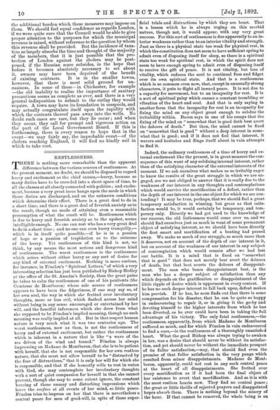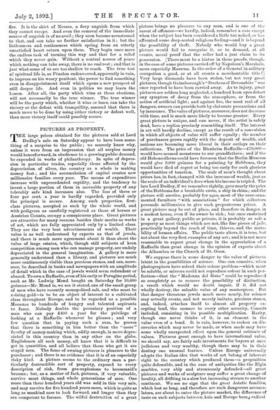RESTLESSNESS.
THERE is nothing more remarkable than the apparent difference between the various sources of restlessness. At the present moment, no doubt, we should be disposed to regard hurry and excitement as the chief causes,—hurry, because so many duties have to be crowded into a short space of time, to all the classes at all closely connected with politics ; and excite- ment, because a very great issue hangs upon the mode in which those duties are discharged, and on the unknown conditions which determine their effect. There is a great deal to do in a short time, and there is a great deal of feverish anxiety as to the result, though no mode of attaining even a reasonable presumption of what the result will be. Restlessness which is due to harry and feverish anxiety as to the upshot, seems intelligible enough. No one can rest who has a very great deal to do in a short time ; and no one can even hurry tranquilly,— which is in itself quite possible,—if he is in a passion of hope or a passion of trepidation as to the outcome of the hurry. Yet restlessness of this kind is not, we think, by any means the most serious and dangerous kind of restlessness. The worst restlessness is the restlessness which arises without either hurry or any sort of desire for any kind of external excitement. Nothing is more curious, for instance, in Fenelon's "Spiritual Letters," of which a very interesting selection has just been published by Bishop Hedley at the office of the St. Anselm's Society, than the great pains he takes to calm the restlessness of one of his penitents (the Comtesse de Montberon) whose sole source of restlessness appears to have been the fidgetiness, if one may say so, of her own soul, the way in which she fretted over involuntary thoughts, more or less evil, which flashed across her mind without being in any sense encouraged or entertained by her will, and the fanciful inferences which she drew from what she supposed to be Fenelon's implied meaning, though no such meaning was really implied at all. But in that respect human nature is very much what it was two centuries ago. The worst restlessness, now as then, is not the restlessness of hurry and of external excitement, but rather the restlessness which is inherent in a nature that is like "a wave of the sea driven of the wind and tossed." Fenelon is always impressing on Madame de Montberon, that she is to be patient with herself, that she is not responsible for her own restless nature, that she must not allow herself to be "distracted by the fear of distractions," that it is only her will for which she is responsible, and that if she honestly wills to rest in union with God, she may contemplate her involuntary thoughts with a sort of quiet compassion for herself in that she cannot prevent, though she may to some extent ignore, the constant buzzing of those uneasy and disturbing impressions which leave the surface at all events of her mind, so little peace. Fenelon tries to impress on her that there is nevertheless a central peace for men of good-will, in spite of those super- ficial trials and distractions by which they are beset. That is a lesson which he is always urging on this morbid nature, though not, it would appear, with any very great success. For this sort of restlessness is due apparently to an in- terior weakness rather than to an interior vitality and strength. Just as there is a physical state too weak for physical rest, in which the constitution does not seem to have sufficient spring to admit even of disposing itself for sleep, so there is a spiritual state too weak for spiritual rest, in which the spirit does not seem to have enough spring to admit even of disposing itself to receive the gift of peace. It is not -vitality, but loss of vitality, which reduces the soul to continual fuss and fidget over its own spiritual state. And that is a restlessness which is so common even now, that, except in unusually strong characters, it puts to ffight all inward peace. It is not due to a capacity for movement, but to an incapacity for rest. It is a sort of spiritual palsy which causes a constant trembling or vibration of the heart and soul. And that is only saying in another form that the incapacity for rest is an incapacity for fixing the mind on any object great enough to subdue the irritability within. Bacon says in one of his essays that the fixing of the mind on "somewhat that is good doth best avert the dolours of death." But then, the mind cannot be fixed on "somewhat that is good" without a deep interest in some- what that is good; and if it does not feel that interest, it wavers and hesitates and flings itself about in -vain attempts to find it.
Indeed, the ordinary restlessness of a time of hurry and ex- ternal excitement like the present, is in great measure the con- sequence of this want of any subduing internal interest, rather than of the satisfying character of the external interests of the moment. If we ask ourselves what makes us so irritably eager to know the results of the great struggle in which we are en- gaged, are we not obliged to answer that it is really due to the weakness of our interest in any thoughts and contemplations which would survive the mortification of a defeat, rather than the depth of our interest in the one object for which we are con- tending? It may be true, perhaps, that we should feel a great temporary satisfaction in winning, but great as that satis- faction would be, it would certainly be temporary, and tem- porary only. Directly we had got used to the knowledge of our success, the old listlessness would come over us, and we should find ourselves just as much in want of some permanent object of satisfying interest, as we should have been directly the first smart and mortification of a beating had passed away. We make so much of our struggle, so much more than it deserves, not on account of the depth of our interest in it, but on account of the weakness of our interest in any subject of contemplation which would remain after we had lost our battle. It is a mind that is fixed on "somewhat that is good" that does not merely best avert the dolours of death, but that best averts the dolours of disappoint- ment. The man who bears disappointment best, is the man who has a deeper subject of satisfaction than any which depends on the gratification or disappointment of the little ripple of desire which is uppermost in every contest. If he has no such deeper interest to fall back upon, defeat makes him peevish. If he has, he soon finds out that there is some compensation for his disaster, that he can be quite as happy in endeavouring to repair it, or in giving it the go-by and devoting himself to the higher interests from which he has been diverted, as he ever could have been in taking the full advantage of his victory. The only fatal restlessness,—the restlessness, apparently, from which Madame de Montberon suffered so much, and for which Fenelon in vain endeavoured to find a cure,—is the restlessness of a thoroughly unsatisfied heart. What the good Bishop was always trying to awaken in her, was a desire that should never be without its satisfac- tion, and yet should never be without the immediate prospect of its faller satisfaction,—nay, that should find even the promise of that fuller satisfaction in the very pangs which resulted from minor disappointments. Madame de Mont- heron, apparently, could not rest in any such central peace at the heart of all disappointments. She fretted over every mortification as if it had been the final object of her existence to avert that mortification. And so it is with the most restless hearts now. They find no central peace; the great or little thrills of rejected prayers and disappointed hopes absorb them. There is nothing beyond the misery of the hour. If that cannot be removed, the whole being is on fire. It is the shirt of Nessus, a fiery anguish from which they cannot escape. And even the removal of the immediate source of anguish is of no avail ; they soon become accustomed to that, and can take no further satisfaction in it ; but the listlessness and restlessness which spring from an utterly unsatisfied heart return upon them. They begin once more the endless task of turning this way and that for a relief which they never gain. Without a central source of peace which nothing can take away, there is no real rest ; and that is just what some of us are too shallow to reach. The true test o2 spiritual life is, as Fenelon endeavoured, apparently in vain, to impress on his weary penitent, the power to find something even in disappointment itself which opens a new prospect of still deeper life. And even in politics we may learn the lesson. After all, the party which wins at these elections, will not necessarily be the true winner. The true winner will be the party which, whether it wins or loses, can take the victory or the defeat with tranquillity, assured that there is much more to be done by using either victory or defeat well, than mere victory itself could possibly secure.











































 Previous page
Previous page